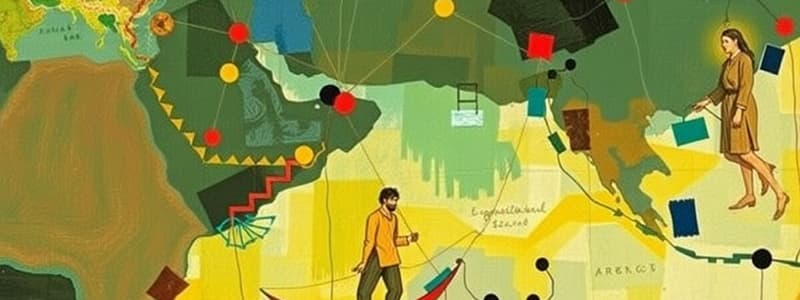Podcast
Questions and Answers
How may different groups interpret the shift from trade to territorial expansion?
How may different groups interpret the shift from trade to territorial expansion?
Indigenous populations might view it as colonization and loss of sovereignty, while colonizers may see it as opportunity and economic growth.
What role did case studies play in understanding the relationship between trade and territorial expansion?
What role did case studies play in understanding the relationship between trade and territorial expansion?
Case studies illustrate specific historical examples that show how trade routes often led to direct conquest or influence, like European colonization.
What long-term effects result from the transition from trade to territorial control?
What long-term effects result from the transition from trade to territorial control?
It impacts global politics by creating power imbalances and reshaping economic relationships among nations.
In what ways could the perspectives of colonizers and indigenous populations on territorial expansion lead to potential injustices?
In what ways could the perspectives of colonizers and indigenous populations on territorial expansion lead to potential injustices?
How might this chapter suggest the future of trade and international relations, considering historical dynamics?
How might this chapter suggest the future of trade and international relations, considering historical dynamics?
How did early trade networks contribute to cultural exchange?
How did early trade networks contribute to cultural exchange?
What factors influenced the rise of powerful trading cities?
What factors influenced the rise of powerful trading cities?
Explain how the motivations of merchants differed from those of conquering powers.
Explain how the motivations of merchants differed from those of conquering powers.
What were some consequences of territorial expansion for local populations?
What were some consequences of territorial expansion for local populations?
In what ways did the transition from trade to territorial control shape political power?
In what ways did the transition from trade to territorial control shape political power?
Identify a key trade route and describe its significance.
Identify a key trade route and describe its significance.
Discuss how territorial expansion impacted the environment.
Discuss how territorial expansion impacted the environment.
What role did intermediaries play in early trade networks?
What role did intermediaries play in early trade networks?
Flashcards
Multiple Perspectives on Expansion
Multiple Perspectives on Expansion
Different groups involved in the same historical event often perceive and interpret it differently.
Case Studies in Expansion
Case Studies in Expansion
Examples used to illustrate a concept in detail. In this case, specific historical situations are showcased to highlight how trade and territorial expansion played out.
Trade to Territory
Trade to Territory
The process of evolving from primarily trading relationships to direct control of territory, often accompanied by economic and political power shifts.
Impact of Trade to Territory
Impact of Trade to Territory
Signup and view all the flashcards
Looking to the Future
Looking to the Future
Signup and view all the flashcards
Early Trade Networks
Early Trade Networks
Signup and view all the flashcards
Merchants and Traders
Merchants and Traders
Signup and view all the flashcards
Powerful Trading Cities
Powerful Trading Cities
Signup and view all the flashcards
Colonial Expansion
Colonial Expansion
Signup and view all the flashcards
Impacts of Territorial Expansion
Impacts of Territorial Expansion
Signup and view all the flashcards
Motivations for Trade
Motivations for Trade
Signup and view all the flashcards
Trade and Cultural Exchange
Trade and Cultural Exchange
Signup and view all the flashcards
Study Notes
Introduction to Trade and Territorial Expansion
- This period saw a transformation where trade evolved into territorial control.
- Economic interactions formed the basis for political power and empire-building.
- The shift from trade to territory was multifaceted and had complex drivers.
Early Trade Networks
- Ancient and medieval trade routes, like the Silk Road, Indian Ocean trade, and trans-Saharan trade, are discussed.
- Key locations and traded commodities are highlighted.
- These networks facilitated exchange of goods, ideas, and cultures.
- The vital roles of merchants, travelers, and intermediaries are emphasized.
The Role of Merchants and Traders
- Merchants were essential in connecting regions.
- They established routes, developed markets, and facilitated trade.
- Profit, cultural exchange, and knowledge sharing motivated trade.
- The economic growth within societies due to trade is explained.
The Growth of Powerful Trading Cities
- The rise of urban centers as major trade hubs is examined.
- Factors in their flourishing include favorable geography, security, and political stability.
- Examples of trading cities along the Silk Road and Mediterranean are potentially explored.
- Their impact on cultural development and innovation is investigated.
From Trade to Territory
- Trade sometimes led to the formation of colonial holdings.
- Reasons include the demand for resources, access to markets, and political dominance.
- Diverse examples from pre-industrial Europe, Asia, and Africa are possibly included.
- The motivations of both colonizers and indigenous populations are analyzed.
Impact of Territorial Expansion
- The consequences of territorial acquisition are explored, including economic exploitation, cultural clashes, and political instability.
- Environmental consequences like resource depletion are potentially discussed.
- The impact on various social groups is likely analyzed.
Different Perspectives on Expansion
- Different viewpoints of colonizers and indigenous populations are considered.
- Inequalities and injustices resulting from the transition are presented.
Case Studies
- Specific case studies illustrate trade's evolution into conquest or control.
- Examples like European colonization of the Americas, Asia, or Africa, or the growth of the Mughal empire are likely presented.
Conclusion of the Chapter
- The chapter summarizes the shift from trade to territory and its long-term effects.
- Global political and economic impacts are highlighted.
- A potential outlook on the future of trade and international relations is possibly provided.
Studying That Suits You
Use AI to generate personalized quizzes and flashcards to suit your learning preferences.
Description
Explore the transformative period in history where trade evolved into territorial control. This chapter examines the complex dynamics of trade routes like the Silk Road and the crucial role of merchants in empire-building. Discover how economic interactions laid the foundations for political power.




